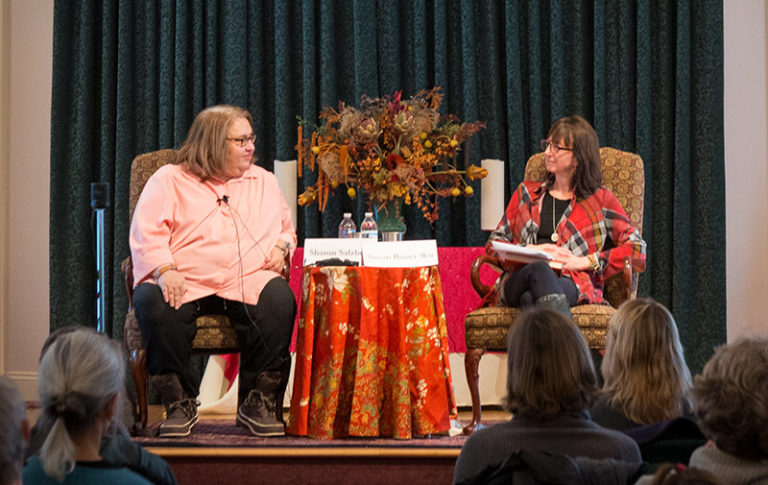
Paying attention, asserts famed meditation teacher, best-selling author, and Mind & Life Fellow Sharon Salzberg, isn’t a skill one is simply born with. Like flexibility and physical stamina, it’s developed over time: a muscle to strengthen; a practice to nurture; a series of neural pathways to establish and expand.
But it takes very real work to move away from our very human tendencies to disconnect, assume, and judge. Salzberg shared these and other reflections on presence and connection before a capacity crowd of more than 200 listeners sitting elbow-to-elbow at a Virginia Festival of the Book event. Mind & Life President Susan Bauer-Wu interviewed the visiting author for more than an hour about meditation, love, cultural discord, and the benefits of mindfulness in the context of Salzberg’s latest book, “Real Love: The Art of Mindful Connection”
At turns funny, contemplative, and strikingly thoughtful, Salzberg’s trademark frankness, humor, and storytelling laid bare the nuts and bolts of living a life defined by love for oneself, and love for others.
Salzberg, who founded the Insight Meditation Society back in the mid-1970s, has led countless retreats, and penned nearly a dozen books on love, kindness, and meditation—admits she, too, struggles with the tendency to disconnect so inherent in modern life. She laughingly revealed that she regularly recoils at impromptu conversations and eye contact with strangers while in the elevator of her apartment building. But when we consciously shift gears to pay attention, to authentically offer love, and connect, says Salzberg, metta (the Buddhist term for friendship, freedom of the heart, and lovingkindness) is achieved.
“Mindfulness is an incredible asset,” Salzberg told Bauer-Wu. And its practice isn’t complicated. What Salzberg calls “micro-moments” happen when we purposefully pivot our attention to the breath, to the present, shed judgment, and open our hearts. While sitting in traffic. Waiting in line. Between tasks while seated in our office chairs.
She was careful to note, however, that her definition of love isn’t the gooey variety of rom coms, or the conditional love so often entangled with success and materialism. And it isn’t something you only receive when you’re worthy or have satisfied a series of preconditions.
Love is “often viewed as though it’s something in someone else’s hands,” says Salzberg. “But it’s not a UPS package for someone to give us; it’s something that’s inside us. And if we want love, it’s also our responsibility to be present and accountable.”
Salzberg’s observations on love and compassion are rooted in ancient wisdom and recent research findings, many supported by Mind & Life over the past two decades. In distinguishing between empathy and compassion, she refers to the former as the “quivering of the heart in response to a situation,” while the latter implies taking action. “Empathy is a necessary but not sufficient condition for compassion to arise,” she says.
In fielding a question about Charlottesville’s recent strife and the quandary of loving one’s enemies, Salzberg emphasized that love doesn’t necessarily mean liking somebody.
“Buddha said, ‘If you truly loved yourself, you’d never harm another,'” she notes. “But when someone acts harmful, they’re coming from a place of pain, even if it doesn’t always look like it.”
Love is also what grounds and connects us. It’s much like the dream Salzberg shared in which she was asked to answer the question: Why do we love people?
“Because they see us,” she recalls saying, before waking up and thinking, “Wow, that’s a really good answer,” and writing it down.
Watch the full conversation between Susan Bauer-Wu and Sharon Salzberg below:

